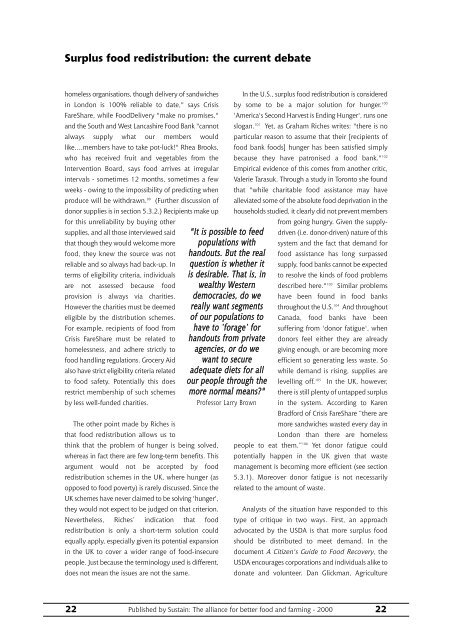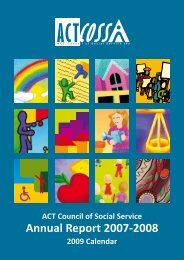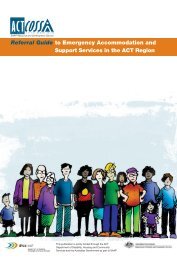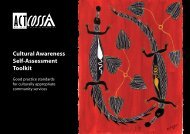Too much and too little? Debates on surplus food redistribution
Too much and too little? Debates on surplus food redistribution
Too much and too little? Debates on surplus food redistribution
Create successful ePaper yourself
Turn your PDF publications into a flip-book with our unique Google optimized e-Paper software.
Surplus <strong>food</strong> redistributi<strong>on</strong>: the current debate<br />
homeless organisati<strong>on</strong>s, though delivery of s<str<strong>on</strong>g>and</str<strong>on</strong>g>wiches<br />
in L<strong>on</strong>d<strong>on</strong> is 100% reliable to date," says Crisis<br />
FareShare, while FoodDelivery "make no promises,"<br />
<str<strong>on</strong>g>and</str<strong>on</strong>g> the South <str<strong>on</strong>g>and</str<strong>on</strong>g> West Lancashire Food Bank "cannot<br />
always supply what our members would<br />
like….members have to take pot-luck!" Rhea Brooks,<br />
who has received fruit <str<strong>on</strong>g>and</str<strong>on</strong>g> vegetables from the<br />
Interventi<strong>on</strong> Board, says <strong>food</strong> arrives at irregular<br />
intervals - sometimes 12 m<strong>on</strong>ths, sometimes a few<br />
weeks - owing to the impossibility of predicting when<br />
produce will be withdrawn. 99 (Further discussi<strong>on</strong> of<br />
d<strong>on</strong>or supplies is in secti<strong>on</strong> 5.3.2.) Recipients make up<br />
for this unreliability by buying other<br />
supplies, <str<strong>on</strong>g>and</str<strong>on</strong>g> all those interviewed said<br />
that though they would welcome more<br />
<strong>food</strong>, they knew the source was not<br />
reliable <str<strong>on</strong>g>and</str<strong>on</strong>g> so always had back-up. In<br />
terms of eligibility criteria, individuals<br />
are not assessed because <strong>food</strong><br />
provisi<strong>on</strong> is always via charities.<br />
However the charities must be deemed<br />
eligible by the distributi<strong>on</strong> schemes.<br />
For example, recipients of <strong>food</strong> from<br />
Crisis FareShare must be related to<br />
homelessness, <str<strong>on</strong>g>and</str<strong>on</strong>g> adhere strictly to<br />
<strong>food</strong> h<str<strong>on</strong>g>and</str<strong>on</strong>g>ling regulati<strong>on</strong>s. Grocery Aid<br />
also have strict eligibility criteria related<br />
to <strong>food</strong> safety. Potentially this does<br />
restrict membership of such schemes<br />
by less well-funded charities.<br />
The other point made by Riches is<br />
that <strong>food</strong> redistributi<strong>on</strong> allows us to<br />
think that the problem of hunger is being solved,<br />
whereas in fact there are few l<strong>on</strong>g-term benefits. This<br />
argument would not be accepted by <strong>food</strong><br />
redistributi<strong>on</strong> schemes in the UK, where hunger (as<br />
opposed to <strong>food</strong> poverty) is rarely discussed. Since the<br />
UK schemes have never claimed to be solving 'hunger',<br />
they would not expect to be judged <strong>on</strong> that criteri<strong>on</strong>.<br />
Nevertheless, Riches’ indicati<strong>on</strong> that <strong>food</strong><br />
redistributi<strong>on</strong> is <strong>on</strong>ly a short-term soluti<strong>on</strong> could<br />
equally apply, especially given its potential expansi<strong>on</strong><br />
in the UK to cover a wider range of <strong>food</strong>-insecure<br />
people. Just because the terminology used is different,<br />
does not mean the issues are not the same.<br />
""IItt iiss ppoossssiibbllee t<str<strong>on</strong>g>too</str<strong>on</strong>g> ffeeeedd<br />
ppooppuullaattiio<strong>on</strong>nss wwiitthh<br />
hhaannddoouuttss.. BBuutt tthhee rreeaall<br />
qquueessttiio<strong>on</strong>n iiss wwhheetthheerr iitt<br />
iiss ddeessiirraabbllee.. TThhaatt iiss,, iinn<br />
wweeaalltthhyy WWeesstteerrnn<br />
ddeemmooccrraacciieess,, ddoo wwee<br />
rreeaallllyy wwaanntt sseeggmmeennttss<br />
ooff oouurr ppooppuullaattiio<strong>on</strong>nss t<str<strong>on</strong>g>too</str<strong>on</strong>g><br />
hhaavvee t<str<strong>on</strong>g>too</str<strong>on</strong>g> ‘‘ffoorraaggee’’ ffoorr<br />
hhaannddoouuttss ffrroomm pprriivvaattee<br />
aaggeenncciieess,, oorr ddoo wwee<br />
wwaanntt t<str<strong>on</strong>g>too</str<strong>on</strong>g> sseeccuurree<br />
aaddeeqquuaattee ddiieettss ffoorr aallll<br />
oouurr ppeeooppllee tthhrroouugghh tthhee<br />
mmoorree nnoorrmmaall mmeeaannss??""<br />
Professor Larry Brown<br />
In the U.S., <strong>surplus</strong> <strong>food</strong> redistributi<strong>on</strong> is c<strong>on</strong>sidered<br />
by some to be a major soluti<strong>on</strong> for hunger. 100<br />
'America's Sec<strong>on</strong>d Harvest is Ending Hunger', runs <strong>on</strong>e<br />
slogan. 101 Yet, as Graham Riches writes: "there is no<br />
particular reas<strong>on</strong> to assume that their [recipients of<br />
<strong>food</strong> bank <strong>food</strong>s] hunger has been satisfied simply<br />
because they have patr<strong>on</strong>ised a <strong>food</strong> bank." 102<br />
Empirical evidence of this comes from another critic,<br />
Valerie Tarasuk. Through a study in Tor<strong>on</strong>to she found<br />
that "while charitable <strong>food</strong> assistance may have<br />
alleviated some of the absolute <strong>food</strong> deprivati<strong>on</strong> in the<br />
households studied, it clearly did not prevent members<br />
from going hungry. Given the supplydriven<br />
(i.e. d<strong>on</strong>or-driven) nature of this<br />
system <str<strong>on</strong>g>and</str<strong>on</strong>g> the fact that dem<str<strong>on</strong>g>and</str<strong>on</strong>g> for<br />
<strong>food</strong> assistance has l<strong>on</strong>g surpassed<br />
supply, <strong>food</strong> banks cannot be expected<br />
to resolve the kinds of <strong>food</strong> problems<br />
described here." 103 Similar problems<br />
have been found in <strong>food</strong> banks<br />
throughout the U.S. 104 And throughout<br />
Canada, <strong>food</strong> banks have been<br />
suffering from 'd<strong>on</strong>or fatigue', when<br />
d<strong>on</strong>ors feel either they are already<br />
giving enough, or are becoming more<br />
efficient so generating less waste. So<br />
while dem<str<strong>on</strong>g>and</str<strong>on</strong>g> is rising, supplies are<br />
levelling off. 105 In the UK, however,<br />
there is still plenty of untapped <strong>surplus</strong><br />
in the system. According to Karen<br />
Bradford of Crisis FareShare “there are<br />
more s<str<strong>on</strong>g>and</str<strong>on</strong>g>wiches wasted every day in<br />
L<strong>on</strong>d<strong>on</strong> than there are homeless<br />
people to eat them.” 106 Yet d<strong>on</strong>or fatigue could<br />
potentially happen in the UK given that waste<br />
management is becoming more efficient (see secti<strong>on</strong><br />
5.3.1). Moreover d<strong>on</strong>or fatigue is not necessarily<br />
related to the amount of waste.<br />
Analysts of the situati<strong>on</strong> have resp<strong>on</strong>ded to this<br />
type of critique in two ways. First, an approach<br />
advocated by the USDA is that more <strong>surplus</strong> <strong>food</strong><br />
should be distributed to meet dem<str<strong>on</strong>g>and</str<strong>on</strong>g>. In the<br />
document A Citizen's Guide to Food Recovery, the<br />
USDA encourages corporati<strong>on</strong>s <str<strong>on</strong>g>and</str<strong>on</strong>g> individuals alike to<br />
d<strong>on</strong>ate <str<strong>on</strong>g>and</str<strong>on</strong>g> volunteer. Dan Glickman, Agriculture<br />
22 Published by Sustain: The alliance for better <strong>food</strong> <str<strong>on</strong>g>and</str<strong>on</strong>g> farming - 2000 22













